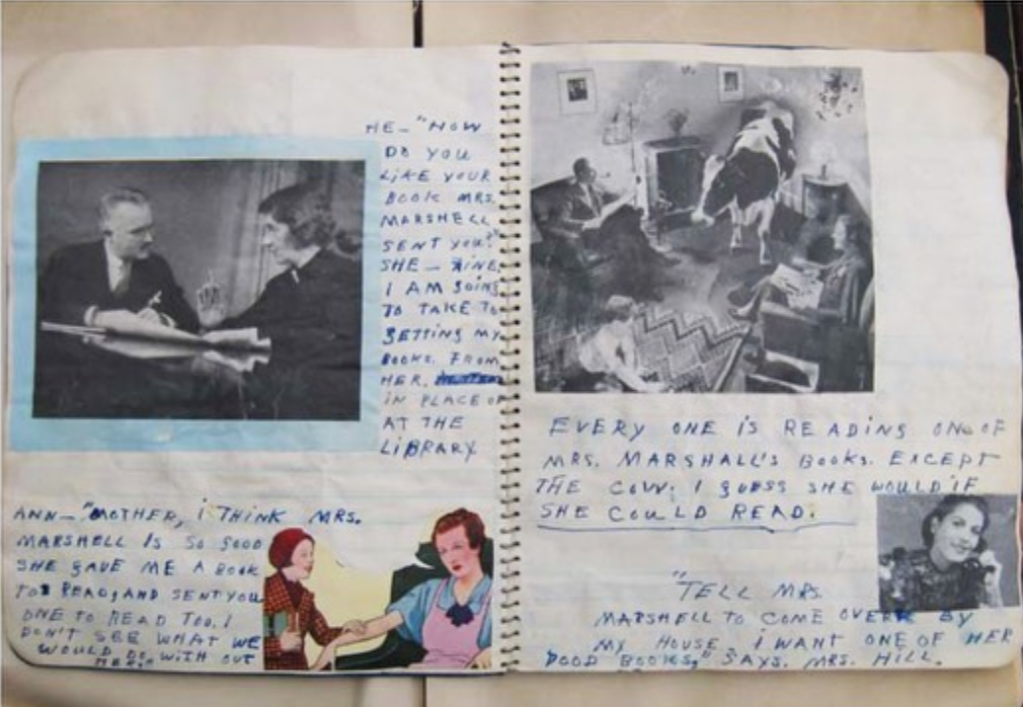By Caroline Nevin (Follow us on LinkedIn)

I’ve belonged to the same book club for over 25 years. It has evolved as people’s lives change of course, but at its core it’s a group of women who want to better understand the world through the writing of people with different perspectives than us. I feel blessed to have been engaged in exploration with them for these many years, and to have read so many intriguing books I would not otherwise have discovered.
In 2021, we read Kim Michelle Richardson’s “The Book Woman of Troublesome Creek.” Two things stood out in reading this glimpse of Kentucky hills history: 1. Poverty was normal and brutal; and 2. Books and librarianship made a difference to people’s lives – particularly for women.
I felt an affinity between the work of these extraordinary women in the Appalachians and our own librarians trying to build bridges to those outside our walls. We don’t mount up on horses and mules to travel through treacherous mountains and weather, but we still have much in common with those stalwart sisters who pushed hard to provide access to information and literature that people could use to improve their lives.
Digging deeper, I was able to find references to the Kentucky packhorse librarians in Wikipedia, the Edinburgh University Press, NPR ,Libraries and the Cultural Record, the Smithsonian and the University of Tennessee. Not a lot of personal memoirs, but some intriguing snippets in historical documents and library archives, and a more recent 26 minute documentary on PBS.
The idea of delivering books to rural Kentucky wasn’t new – an earlier service was funded by a benefactor earlier in the century, but it died when he did. What made this later version so successful was government funding through Franklin Roosevelt’s “New Deal”, between 1935 and 1943. Part job program, part literacy effort, the Pack Horse Library Project employed women to help other women support reading in their families.

Eastern Kentucky was hit hard by the Depression and reduced coal mining. Economic prosperity – and the roads and infrastructure and power they bring – had never reached them. Literacy was identified by groups like the Kentucky Federation of Women’s Groups, as a way to lift up these struggling populations. And so, the Pack Horse Library Project was born.
Philanthropic organizations collected books and publications and packaged them up into crates that were delivered free of charge by the Adams Express Company and L&N Railroad, to library ‘hubs’ (often schools or post offices) where a local ‘book lady’ (and the occasional book man) would distribute them by mule or packhorse across miles of roughscrabble land in the Kentucky hills.
One of the most fascinating facts about these intrepid women is that they were ingenious in creating something out of other people’s ‘nothings’ donated through the service clubs. They would use stories and pictures from worn out books, and information they collected along their route, to create scrapbooks for sharing and reading.
These women of small means themselves would painstakingly gather bits and pieces of old newspapers and magazines, orally transmitted recipes and cures, and hand drawn quilt patterns into scrapbooks that could be loaned out to better the lives of the families on their routes. In effect, they became publishers to fill a gap and meet a huge social need. Rural American reported that where the Pack Horse Libraries roamed, the standard of living rose, in large part due to the information provided on health, hygiene, food, nutrition and childcare1.
The creative, make-do attitude of yesterday’s pack horse librarians really resonates when I look around our public law libraries and talk with others in the US and Canada. Where there are holes and gaps in information and skills, we step up and deliver what’s needed. Our ‘scrapbooks’ are more likely digital but we’re also the only ones providing some things in print that publishers only offer online or in PDF. Like our mounted predecessors, we know people rely on and trust us to deliver the information they need in the form they can best use it. May we always do so with the hardy, pioneering spirit of our predecessors!
Notes
- “Pack Horse Library: A Kentucky W.P.A. Project.” Rural America (October 1 939): 1 1 -1 2, as referenced in Schmitzer, Jeanne Cannella, “The Pack Horse Library Project of Eastern Kentucky: 1936-1943. ” Master’s Thesis, University of Tennessee, 1998 https://trace.tennessee.edu/utk_gradthes/223
——————————————————————–
Notes Between Us (NBU) is a blog about conversations and topics of interest to the writers. The writers are expressing their personal opinions solely. The essays represent their personal beliefs and not that of their workplaces or any organization they are associated with.
